Guide to Montenegro Real Estate
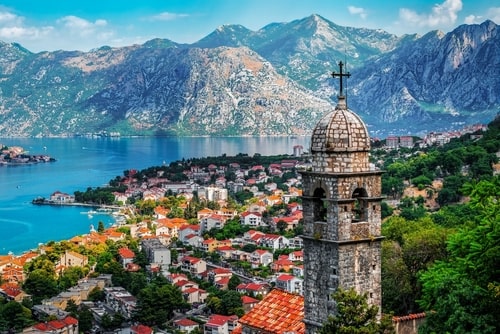
Montenegro is one of Europe’s most exciting up-and-coming destinations for real estate. With a 183-mile Adriatic coastline, historic coastal towns, snow-dusted mountain peaks, and dramatic fjord-like bays, this small Balkan country is attracting global attention.
Buyers from across Europe, North America, and the Gulf States are exploring investment opportunities here, drawn by the stunning scenery, lifestyle, and relative affordability compared to neighboring Croatia.
For expats, digital nomads, or second-home seekers, Montenegro offers a rare combination of natural beauty, accessible residency pathways, and properties at prices that still reflect an emerging market. In this guide, we’ll walk you through the key areas to buy, how the purchase process works, and what you need to know about taxes, costs, and ownership laws as a foreign buyer.
- Guide to Montenegro Real Estate
- Why Invest in Real Estate In Montenegro
- Where to Buy Property in Montenegro
- Can Foreigners Buy Property In Montenegro
- The Real Estate Buying Process in Montenegro
- Can Foreigners Get a Mortgage In Montenegro
- Montenegro Real Estate: Our Thoughts
- Sign up to Overseas Dream Home now, and Discover The Best Places in the World to Buy Real Estate 2025.
- Real Estate Opportunities By Country

Reviewed by Ronan McMahon
Ronan McMahon is an Amazon best-selling author and expert in international real estate. He regularly contributes to Overseas Dream Home. Visit his website at ronanmcmahon.com
Why Invest in Real Estate In Montenegro
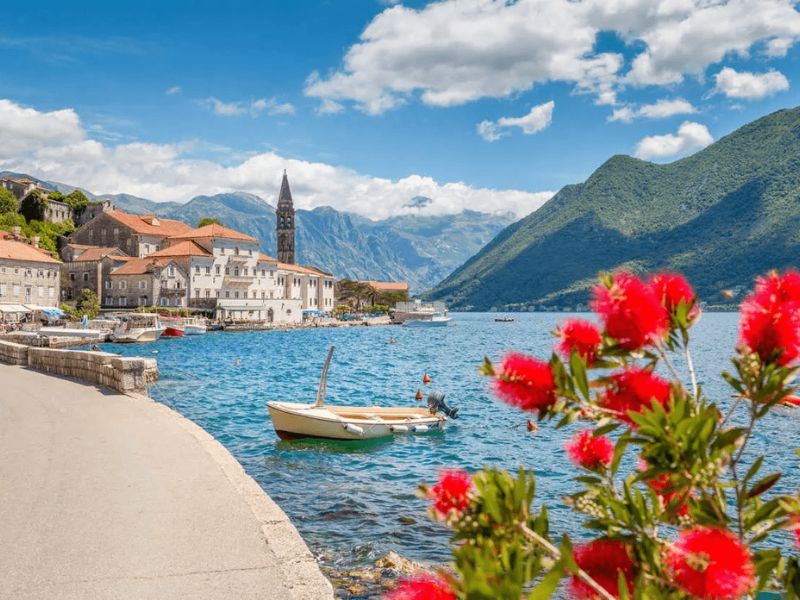
If you’re wondering why you never heard of Montenegro, you’re not alone.
Tucked away in the Balkans between a cluster of former Yugoslavian countries, Montenegro is smaller than the state of Connecticut. It sits across the Adriatic from Italy, with Croatia to the north and Albania to the south.
Montenegro has finally arrived as a destination. It’s being touted as the latest “it” spot of the Mediterranean. A place that’s still relatively unexplored by most westerners, but with the potential to have the same phenomenal tourism growth that neighboring Croatia saw over the past two decades.
The country has all the markers of a destination with serious long-term potential. The tourism sector is surging, and the country is positioning itself as a luxury travel hub with new marinas, resorts, and infrastructure aimed at high-net-worth travelers.
It boasts one of the most dramatic stretches of coastline in all of Europe, as well as some of the continent’s wildest and most beautiful mountains. Its 183-mile Adriatic coastline is liberally sprinkled with historic towns, lively beach resorts, secluded coves and white-stone fishing villages, all punctuated by strips of fine sand and pebbled beaches. The wild and remote interior, meanwhile, is a landscape of snow-dusted peaks, crystal-clear lakes, rivers, forests and canyons.
Real estate prices are significantly lower than in nearby Croatia, sometimes half the cost. However, it’s not staying that way for long. Prices are already catching up fast due to rising demand.
It’s also strategically located, just across the Adriatic from Italy and within easy reach of Croatia, Albania, and Greece. Montenegro uses the euro as its currency and is a NATO member on the path toward full EU membership. Add to that the legal right for foreigners to own property, a variety of residency options, and high-quality coastal real estate, and it becomes clear why Montenegro is on the radar for global buyers.
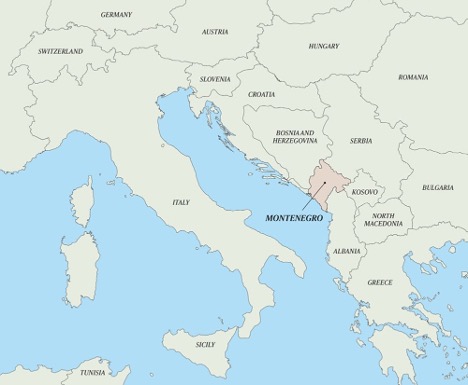
Montenegro sits right across the Adriatic from Italy, and the people here share a similar laidback Mediterranean lifestyle.
Where to Buy Property in Montenegro
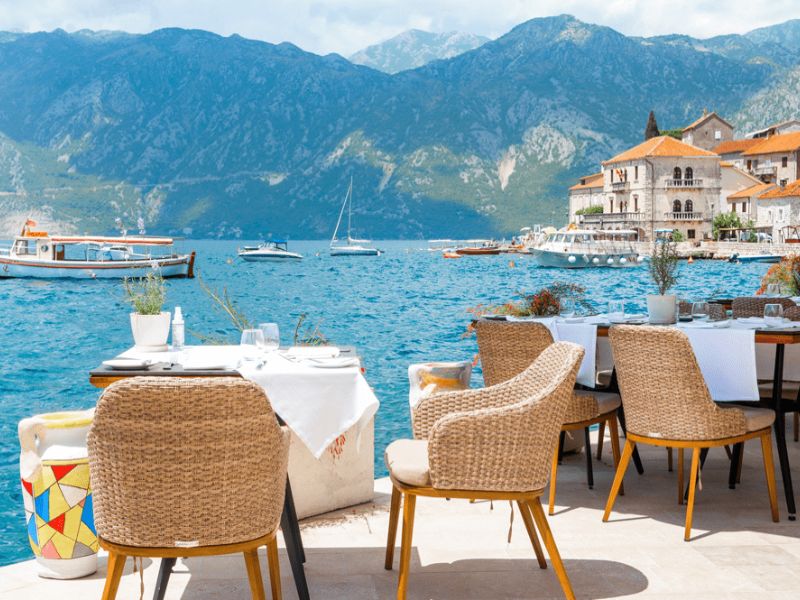
Montenegro’s real estate market is centered along its Adriatic coast and the scenic Bay of Kotor. These areas offer strong lifestyle appeal and increasing rental potential, especially in the high season from May through September.
Kotor
Kotor is one of the most iconic and desirable locations in the country. This UNESCO World Heritage city sits on the Bay of Kotor, offering a mix of Venetian architecture, medieval charm, and waterfront living.
Kotor’s Old Town is considered the best-preserved medieval settlement that still exists in the Mediterranean. It’s a jumble of gray-stone, red-tile-roof buildings amid a tangle of stone lanes and alleys. Situated less than an hour from Dubrovnik Airport (if you can avoid border lines) and with its own regional airport at Tivat, it’s also one of the most accessible parts of the coast.
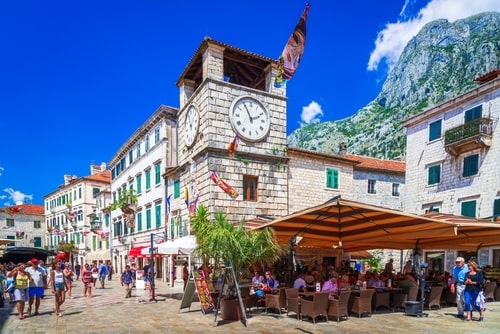
The charming streets of the historic Old Town Kotor are drawing increasing numbers of visitors to this once overlooked part of Europe.
Strolling Old Town Kotor, you’ll randomly come upon decent-sized squares that are lined with restaurants and pubs, most of them al fresco at all times of the year. Winter can be quite gray, cold, and rainy—the upside being that you often have Old Town nearly to yourself.
It’s a popular choice for buyers looking for historic apartments or villas with character and views. Prices are rising here, especially within the walled Old Town and nearby Dobrota.
Budva
About a 40-minute drive south of Kotor, Budva is Montenegro’s busiest coastal town. Nicknamed the “Montenegrin Miami,” it’s known for its beaches, watersports, and nightlife. Budva is jam-packed with tourists who like to sunbathe during the day, and party into the night at one of the many buzzing bars and nightclubs.
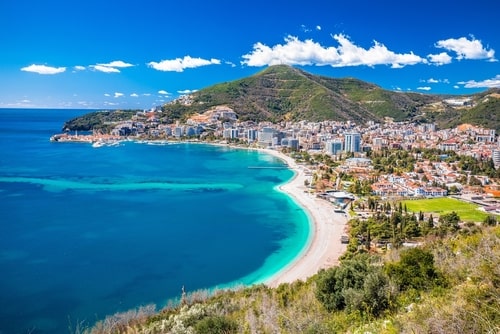
Budva is known for its beaches and buzzing atmosphere.
Despite the party-town reputation, however, most visitors find it pleasant and relaxed (aside from the busy traffic). No loud music spilling onto the street. And even the city’s construction is forced to pause during peak tourist season to maintain the peaceful atmosphere, which is a nice touch.
Real estate here ranges from seafront condos and new-build apartments to hillside homes with Adriatic views. Budva attracts buyers who want vibrant surroundings and a mix of rental and lifestyle potential.
Herceg Novi
Herceg Novi sits near the Croatian border and offers a quieter alternative to Budva and Kotor. It’s popular with buyers from Western Europe and offers a range of traditional stone houses, villas, and apartments. The town has a relaxed feel and is within easy reach of both Dubrovnik and Tivat airports.
Petrovac
Petrovac is a small town enclosed in a stunning bay. This was where the Romans built their summer villas long ago. Today, its beautiful beach is fronted by a long promenade, which brings you to a 16th-century Venetian fortress guarding a tiny stone harbor.
Petrovac’s central location on the Montenegrin coast makes it an ideal location for a base. Budva is just 30 minutes’ drive north, Bar is 30 minutes’ south, and the capital of Montenegro, Podgorica, only an hour away.
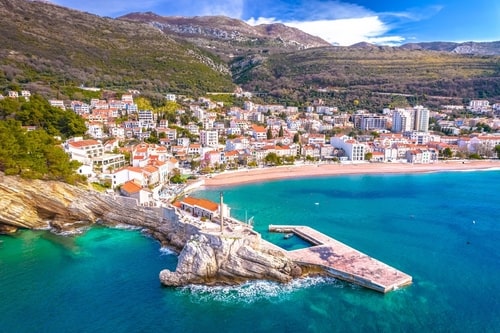
Petrovac sits on a small enclosed bay, making it a popular choice for those looking for a quieter lifestyle.
Bar and Ulcinj
Bar and Ulcinj, located further south, offer better value and more local character. These areas are less touristy, but infrastructure is improving and prices remain more accessible. For buyers looking for long-term potential and less competition, these towns may be worth exploring.
Can Foreigners Buy Property In Montenegro
You can buy property in Montenegro as a foreigner. In fact, the process is relatively straightforward compared to many other countries, particularly since the country encourages foreign investment.
Note that foreigners can buy property freely, except for agricultural land (unless purchased via a registered company) and properties close to military/strategic zones.
The Real Estate Buying Process in Montenegro
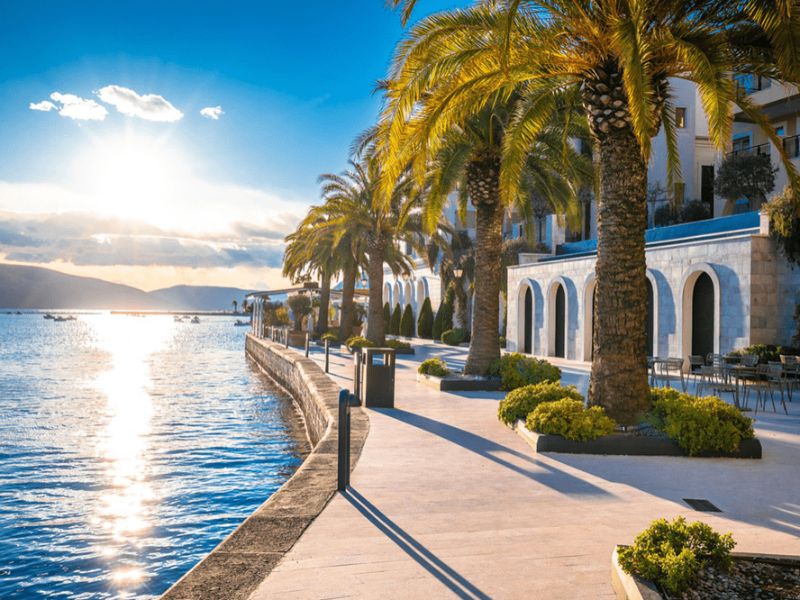
Buying property in Montenegro is a relatively simple and secure process for foreigners. There are no restrictions on foreign ownership of apartments or homes; with only restrictions on the purchase of agricultural land or properties close to military/strategic zones.
Here’s a step-by-step breakdown of the property buying process:
Find a Property
Use local real estate agents or online listing sites.
Hire a Local Lawyer
Although this is not mandatory, it is highly recommended. Your lawyer will:
- Check land registry records.
- Ensure there are no legal disputes, debts, or encumbrances.
- Assist with drafting the contract.
- Legal fees typically range from 0.5% to 1% of the property price.
Check Property Documentation and Status
Your lawyers will help with these tasks:
- Verify ownership in the Land Registry.
- Confirm no mortgages, liens, or usage restrictions.
- In case of land, confirm building permits/zoning laws.
Make a Preliminary Agreement
This is optional and not legally required, but it offers a method where you can reserve the property. It outlines the agreed sale price and timeframe for finalizing the purchase and usually involves a 10% deposit.
Sign the Sales Contract
The final contract must be signed in front of a Montenegrin notary. The contract must be in Montenegrin, and, if you’re a foreigner, a court translator will be required during the signing. Payment is typically made through a bank transfer.
Register the Property
Finally, your lawyer will submit the documentation to the government’s Real Estate Administration to officially register you as the new owner. This can take from a few days to a few weeks.
Fees & Taxes When Buying Real Estate in Montenegro
When purchasing a property in Montenegro you will pay a property transfer tax of 3% of the purchase price for existing property. There is no tax on new builds, although VAT, which is typically 21%, may apply as it does with other new goods and services.
Annual property taxes range between 0.25% and 1%
Can Foreigners Get a Mortgage In Montenegro
Montenegro is predominantly a cash market. As such, getting bank financing as a foreigner is tough, time-consuming, and complicated to the point that very few people qualify. Fortunately, there are alternative forms of financing.
For example, if you’re buying in a new development, some top developers will offer financing to buyers.

Sign up to Overseas Dream Home now, and Discover The Best Places in the World to Buy Real Estate 2025.
Enter your email now to download The Best Places in the World to Buy Real Estate in 2025.
You’ll also start receiving your free Overseas Dream Home eletter in your inbox every day!
No-spam pledge: We value your privacy. You can unsubscribe at any time.
Montenegro Real Estate: Our Thoughts
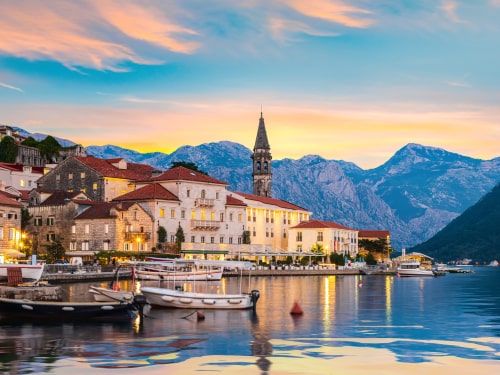
Not only does Montenegro offer a laidback lifestyle, it also has affordable real estate prices…for now.
Montenegro is one of the most accessible and attractive places to buy real estate in Europe today. With a stunning coastline, a growing tourism sector, and strong legal protections for foreign buyers, it offers the kind of opportunity rarely found in the region.
There are no restrictions on international ownership, and the buying process is straightforward and secure. Whether you’re looking for a holiday home, a retirement base, or a long-term investment, Montenegro provides both lifestyle and potential upside.
Popular locations like Kotor, Budva, and Herceg Novi offer different blends of culture, scenery, and rental potential. At the same time, less developed areas like Bar and Ulcinj present good value and room for future growth.
With modest transaction costs, full ownership rights, and a supportive legal system, buying property in Montenegro is an ideal destination for buyers looking for a mix of beauty, value, and long-term potential on the Adriatic coast.